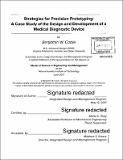Strategies for precision prototyping : a case study of the design and development of a medical diagnostic device
Author(s)
Coble, Benjamin W
DownloadFull printable version (22.82Mb)
Alternative title
Case study of the design and development of a medical diagnostic device
Other Contributors
System Design and Management Program.
Advisor
Maria C. Yang.
Terms of use
Metadata
Show full item recordAbstract
Each phase of the design process possesses its own unique and critical role in developing a user-friendly product or service that meets human needs and improves the quality of everyday life. Prototyping is one of the most vital of these phases, as it allows designers and researchers to pose questions, test hypotheses, measure outcomes, and make improvements. The faster this cycle can be implemented, the more iterations can be accomplished in a given amount of time, culminating in a higher-quality and more desirable final result. However, some prototyping questions demand a higher degree of precision to provide measurable results, potentially slowing down the process and reducing the number of iteration cycles that can be accomplished. The need for thoughtful and efficient precision prototyping methods persists throughout a number of industries, particularly the medical field. This thesis presents findings related to successful (and unsuccessful) prototyping strategies used in the design and development of a sample loading system for the Digital Diffraction Diagnostic (D3), a medical device embodying technology developed by the Weissleder Group at Massachusetts General Hospital's Center for Systems Biology. As a result of numerous interviews and observations, user research findings and pain points are presented. A brief overview of existing related products and literature is offered, with discussion regarding the relationship of each to D3. Ideation and prototyping of design concepts are exhibited, with attention given to failures and improvements in each iteration. The resulting final product is presented, with an overview of features and considerations that impact the overall user experience of the system, as well as a brief outline of the production plan going forward. Finally, learnings and recommendations are offered based on the outcomes of various strategies used in the prototyping stage.
Description
Thesis: S.M. in Engineering and Management, Massachusetts Institute of Technology, System Design and Management Program, 2017. "June 2017." Cataloged from PDF version of thesis. Includes bibliographical references (pages 103-104).
Date issued
2017Department
Massachusetts Institute of Technology. Engineering and Management Program; System Design and Management Program.; Massachusetts Institute of Technology. Integrated Design and Management ProgramPublisher
Massachusetts Institute of Technology
Keywords
Engineering and Management Program., Integrated Design and Management Program., System Design and Management Program.